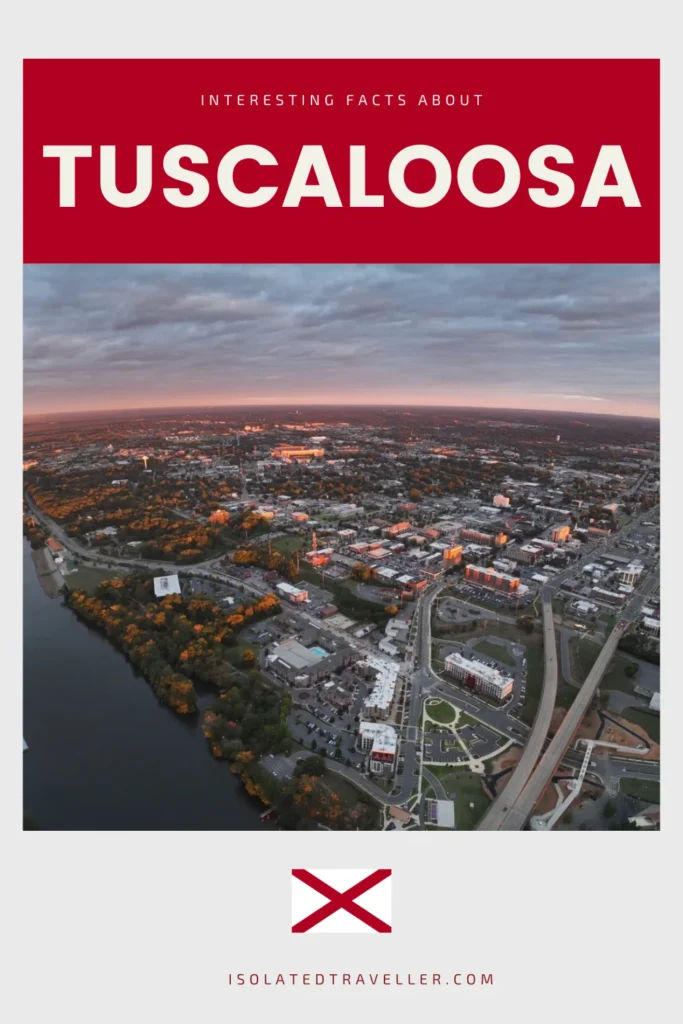Facts About Tuscaloosa
Tuscaloosa was named after Tuskaloosa, the chief of a band of Muskogean-speaking people defeated by the forces of Spanish explorer Hernando de Soto in 1540 in the Battle of Mabila, in what is now central Alabama.
In 2008, Tuscaloosa hosted the USA Olympic Triathlon trials for the Beijing Games.
Tuscaloosa is known as “the Druid City” because of the numerous water oaks planted in its downtown streets since the 1840s.
The city of Tuscaloosa celebrated its 200th birthday on December 13, 2019, with city officials holding various dedications and commemorative events throughout the city, including the displaying of a “bicentennial quilt” and a fireworks display following the 44th Annual West Alabama Christmas Parade, which was dedicated to the city’s birthday.
Tuscaloosa has a total area of 72.22 square miles, of which 62.15 square miles is land and 10.07 square miles, is water as of 2023.
The highest recorded temperature in Tuscaloosa at the Tuscaloosa Regional Airport was 107 °F on July 29, 1952, and August 10, 2007, and the lowest recorded temperature was −1 °F on January 21, 1985
The Tuscaloosa Sister Cities Commission was formed in 1986. The city currently has sister city relationships with cities in three countries: Narashino, Chiba, Japan; Schorndorf, Baden-Württemberg, Germany and Sunyani–Techiman, Ghana.
On April 27, 2011, Tuscaloosa was hit by a 1.5 mi wide EF4 tornado that resulted in 64 deaths, more than 1500 injuries, and massive devastation.
In 1825, Tuscaloosa was selected to replace Cahaba as the state capital, holding this status until 1846. Subsequently, legislators opted to relocate the capital to Montgomery, situated in the heart of the state along the Alabama River.
Tuscaloosa City encompasses several key districts: West Tuscaloosa; Central/Midtown Tuscaloosa; Downtown Tuscaloosa; The University of Alabama’s main campus; Alberta City; North River and Hillcrest.
According to the 2020 United States Census, the city had a population of 99,600 individuals, with 36,779 households and 20,176 families residing therein.
The Tuscaloosa Public Library is a joint city-county agency with nearly 200,000 items and approximately 47,000 registered patrons
Tuscaloosa is renowned as the birthplace and residence of Deontay Wilder, a professional boxer who held the WBC Heavyweight Title from 2015 to 2020, successfully defending it 10 times.
According to a 2019 publication by the University of Alabama, there were a total of 85 traffic signals in the vicinity of Tuscaloosa.
On March 29, 1865, General John Croxton and 1,500 troops marched from Birmingham to Tuscaloosa, resulting in partial destruction of the city and the University of Alabama. Their orders included the demolition of factories, the bridge, and significant structures within the university grounds.
Tuscaloosa is known for its unique culinary offerings, including traditional Southern dishes, barbecue, and seafood.
Tuscaloosa is emerging as a hub for innovation and technology, with initiatives such as the Tuscaloosa Innovation and Technology Summit and the Alabama Innovation and Mentoring of Entrepreneurs (AIME) program fostering entrepreneurship and tech-driven economic development.
Tuscaloosa has literary ties, with authors such as Harper Lee, Fannie Flagg, and Winston Groom having connections to the city. Harper Lee, author of “To Kill a Mockingbird,” attended the University of Alabama and worked for the student newspaper, The Crimson White.
Tuscaloosa has its share of folklore and legends. One notable story is that of the “Druid City Witch,” a mysterious figure said to haunt the streets of Tuscaloosa, particularly around the historic Druid City Cemetery.
Tuscaloosa is synonymous with college football, thanks to the success of the University of Alabama’s football program, led by legendary coach Paul “Bear” Bryant and more recently by Nick Saban.


